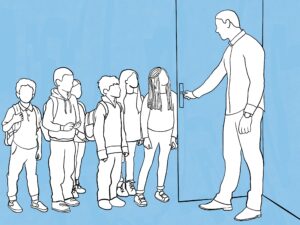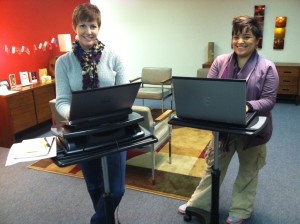Reading Time: 4 minutes Last week on September 28, 2011, President Obama addressed the students of the nation from Benjamin Bannecker Academic High School in Washington, D.C. This was his third annual back-to-school address to the nation’s students and the second one I watched with my son, Finn. Finn is in first grade and will soon be seven. For the first time, this year he was old enough to know that the President was speaking to him and his classmates. It was truly enlightening for me to sit with him this year and hear what the President had to say from the perspective of a six-year-old.
Last week on September 28, 2011, President Obama addressed the students of the nation from Benjamin Bannecker Academic High School in Washington, D.C. This was his third annual back-to-school address to the nation’s students and the second one I watched with my son, Finn. Finn is in first grade and will soon be seven. For the first time, this year he was old enough to know that the President was speaking to him and his classmates. It was truly enlightening for me to sit with him this year and hear what the President had to say from the perspective of a six-year-old.
His class had spoken about the speech at school and he brought home the beautiful picture you see here, complete with the President standing alongside the White House. When we sat down to watch the speech he told me that he didn’t know the President of the United States had time to talk to a bunch of kids, but that he heard Mr. Obama (as he calls him) say that he and his class were really important and needed to work hard. We sat back on the sofa, me with my notebook, and Finn with a stash of homemade playing cards he has been working on. We listened together, occasionally looking over at each other to gauge our reactions.
Of course, what I heard as I listened was different than what Finn heard. He spent some time fumbling with his cards, fidgeting in his chair and looking at the ceiling as I took notes. During the speech, I could feel myself nodding in agreement to the calls for students to work hard and take responsibility for education; I felt called to action as the President spoke about making America’s schools as strong as they could be; I was emboldened to think more about reforms to our system as he talked about rising as a country to once again have the highest percentage of young people with a college degree; I felt pride in the accomplishments of the young entrepreneurs he used as examples; as a parent, I felt obligated and determined to make sure my children get a great education; and I felt determined to make sure all the children of this country have that same opportunity.
When the speech finished, Finn and I had a conversation about what we watched that went something like this:
Me: You said President Obama thinks that you and your classmates are really important? Why might he think that?
Finn: There’s two reasons, I think. We have to do our very best and if he didn’t tell us to we might forget. And our teachers work really hard, even harder than I thought. If we don’t work hard for them, then they would just work hard for nothing.
Me: I think you understand a lot about what he was saying and you are probably right about those two reasons. We want to please our teachers and work hard like they do and it is helpful to have the President remind us of something we should do. Can you think of some reasons why working hard would be important for you and your classmates at school too?
Finn: Well…you remember when I didn’t know what addition meant and I got mad when you made me play Addition Bingo. I learned all about addition at school and now when we play I always win. Oh, and the President said we have to go to college and get jobs. I am going to be a race car driver and you said I had to know how to read to drive.”
Me (laughing): That is true. I am glad you watched with me. I never would have thought the President’s speech might be relevant to your plans to become a race car driver.
Finn: You know what else the President said, Mom. He said that school is about trying new things. I am going to try new things and when I don’t do them right I will just try again. Next time we have art I am going to listen to what the teacher says and not just work on my comic book.
As we turned off the computer screen we had been watching on, I felt proud that he was thinking about school and learning as positive opportunities—and, I must admit, I felt a little disappointed that he hadn’t been listening in art.
But the thing I took away from that conversation wasn’t something that made me proud as a parent or something the President said. It was the amazing ability children have to try new things. Learning addition or the basics of calculus, learning that a group of letters is a sound and that sound is a word, or learning the proper technique for a great jump shot are all big, sometimes scary steps and they require faith in your teachers, coaches and school leaders. And they require a leap into the unknown that stems from a belief we all have to have to grow up: Change is necessary to grow.
Change is necessary for growth in our educational system too. As we work towards reforming educational policies and practices to create stronger schools and to support our teachers and students, we have to be willing to make big changes and to learn the lessons offered from past experiences, new research and other types of systems from around the country and the globe.
So as I continue with my work here at West Wind and at home, I will take a cue from Finn and his classmates and pledge to be willing to learn and push myself and my thinking to new levels, even if that makes me uncomfortable sometimes.
 I have easily watched more television since the Olympics began on July 27 than I have since July of last year. It is so easy to just keep watching event after event. The command athletes have over their sports, their bodies, and their minds is evident and addictive to watch and think about. But, the actual competition is only part of the story and only part of what keeps me roped in. Continue reading “Olympic chatter chastising a champion”
I have easily watched more television since the Olympics began on July 27 than I have since July of last year. It is so easy to just keep watching event after event. The command athletes have over their sports, their bodies, and their minds is evident and addictive to watch and think about. But, the actual competition is only part of the story and only part of what keeps me roped in. Continue reading “Olympic chatter chastising a champion”

 Watching a popular video clip on YouTube typically causes me to laugh at a clever bit of irony or to groan at some ridiculous slapstick. More often than not, clips involve cute babies, funny pets, or somebody falling down and being embarrassed – far from intellectually challenging. I recently watched a video that was sentimental, but also thought provoking. Caine’s Arcade features Caine Monroy, a nine year old boy who lives in an East Los Angeles. To keep himself busy while his dad works in his used auto parts store, Caine spends months building an arcade out of cardboard boxes and miscellaneous found objects and dreams of the day when customers will come and play in his arcade. Nirvin Mullick just happens to come into the shop in search of an auto part, notices this little boy and his arcade, and becomes not only the first customer in Caine’s Arcade, but an advocate for creative kids everywhere. Remarkably, Nirvin is a film maker and skillful in the use of social media. He organizes a flash mob to bring customers into Caine’s Arcade and uses Facebook to create interest, which draws in television media and a lot of exposure through reddit. Nirvin films Caine before the surprise flash mob and captures his reaction when he sees the crowd and interacts with a throng of eager customers. The film was posted to the internet. (My viewing was hit # 3,086,106 on
Watching a popular video clip on YouTube typically causes me to laugh at a clever bit of irony or to groan at some ridiculous slapstick. More often than not, clips involve cute babies, funny pets, or somebody falling down and being embarrassed – far from intellectually challenging. I recently watched a video that was sentimental, but also thought provoking. Caine’s Arcade features Caine Monroy, a nine year old boy who lives in an East Los Angeles. To keep himself busy while his dad works in his used auto parts store, Caine spends months building an arcade out of cardboard boxes and miscellaneous found objects and dreams of the day when customers will come and play in his arcade. Nirvin Mullick just happens to come into the shop in search of an auto part, notices this little boy and his arcade, and becomes not only the first customer in Caine’s Arcade, but an advocate for creative kids everywhere. Remarkably, Nirvin is a film maker and skillful in the use of social media. He organizes a flash mob to bring customers into Caine’s Arcade and uses Facebook to create interest, which draws in television media and a lot of exposure through reddit. Nirvin films Caine before the surprise flash mob and captures his reaction when he sees the crowd and interacts with a throng of eager customers. The film was posted to the internet. (My viewing was hit # 3,086,106 on  For students returning to school this fall lunch in the cafeteria will look different. That’s because the upcoming school year marks the beginning of the new
For students returning to school this fall lunch in the cafeteria will look different. That’s because the upcoming school year marks the beginning of the new  In my second year as a doctoral student, I worked with a professor who was finishing his first book. Among my many tasks was to help him write footnotes for his first chapter. This is how I was introduced to Rosina Lippi-Green’s English with an Accent: Language, Ideology and Discrimination in the United States (1997). Although a bit dated, many of the points she makes are still salient as we consider creating and implementing effective policies to assist English Language Learners (ELLs).
In my second year as a doctoral student, I worked with a professor who was finishing his first book. Among my many tasks was to help him write footnotes for his first chapter. This is how I was introduced to Rosina Lippi-Green’s English with an Accent: Language, Ideology and Discrimination in the United States (1997). Although a bit dated, many of the points she makes are still salient as we consider creating and implementing effective policies to assist English Language Learners (ELLs).  Yesterday was the last day of school for my first grade son. He came home with a backpack full of journals filled with writing, unsharpened pencils, jackets I thought were gone forever, and a bag of candy from his teacher. His younger sister will go to Kindergarten in the fall and she is full of questions about school. She asked him what the best thing about first grade is. His reply made me both smile and frown as comments from older brothers to younger sisters often do. He said, “My teacher, of course. She is cool and nice. But she is going to a new school, so she won’t be your teacher.” My daughter looked a bit sad, but then he said, “You know school is a nice place to go. There’s recess and P.E. and music. And when you do have to learn stuff the teachers make it fun, so you don’t want to leave. Plus you get rewards if you are good. I can show you how to act good.” I am not sure what exactly that means, but I am choosing to be proud of it anyway.
Yesterday was the last day of school for my first grade son. He came home with a backpack full of journals filled with writing, unsharpened pencils, jackets I thought were gone forever, and a bag of candy from his teacher. His younger sister will go to Kindergarten in the fall and she is full of questions about school. She asked him what the best thing about first grade is. His reply made me both smile and frown as comments from older brothers to younger sisters often do. He said, “My teacher, of course. She is cool and nice. But she is going to a new school, so she won’t be your teacher.” My daughter looked a bit sad, but then he said, “You know school is a nice place to go. There’s recess and P.E. and music. And when you do have to learn stuff the teachers make it fun, so you don’t want to leave. Plus you get rewards if you are good. I can show you how to act good.” I am not sure what exactly that means, but I am choosing to be proud of it anyway. 


 Last week on September 28, 2011, President Obama addressed the students of the nation from Benjamin Bannecker Academic High School in Washington, D.C. This was his third annual back-to-school address to the nation’s students and the second one I watched with my son, Finn. Finn is in first grade and will soon be seven. For the first time, this year he was old enough to know that the President was speaking to him and his classmates. It was truly enlightening for me to sit with him this year and hear what the President had to say from the perspective of a six-year-old.
Last week on September 28, 2011, President Obama addressed the students of the nation from Benjamin Bannecker Academic High School in Washington, D.C. This was his third annual back-to-school address to the nation’s students and the second one I watched with my son, Finn. Finn is in first grade and will soon be seven. For the first time, this year he was old enough to know that the President was speaking to him and his classmates. It was truly enlightening for me to sit with him this year and hear what the President had to say from the perspective of a six-year-old.